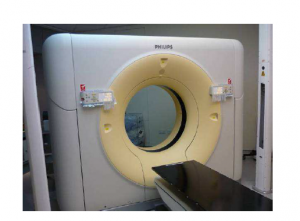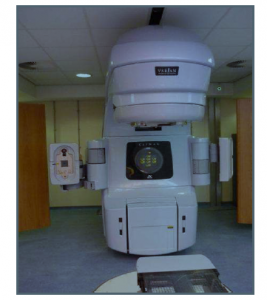- Reference Number: HEY-218/2020
- Departments: Radiotherapy
- Last Updated: 31 July 2020
Introduction
This leaflet has been produced to give you general information about your radiotherapy. Most of your questions should be answered by this leaflet. It is not intended to replace the discussion between you and the healthcare team, but may act as a starting point for discussion. If after reading it you have any concerns or require further explanation, please discuss this with a member of the healthcare team.
This information is intended for patients who are having radiotherapy in one single treatment, 5 sessions or 10 sessions to bone metastases (secondaries), depending upon which is the best treatment for your particular cancer.
What is Radiotherapy?
Radiotherapy is the use of high energy X-rays and other types of radiation to treat cancer. Radiotherapy works by causing chemical and physical damage to the cancer cells in the treatment area. Although some normal healthy cells are also affected these are able to recover and repair themselves.
Radiotherapy can be used for a number of different intended benefits. For example, radiotherapy can be used to control symptoms. Radiotherapy is painless and does not make you radioactive and you are safe to be around people including children whilst you are on treatment.
The Clinical Oncology Consultant, their Registrar or the Consultant Therapeutic Radiographer you are under will have already discussed the treatment, side effects and gained your consent for you to proceed and receive your radiotherapy. There are several stages prior to you actually commencing your treatment.
What happens on the first day?
Some patients receiving radiotherapy treatment will have one radiotherapy session; others will require multiple sessions. Whether you require one session or multiple sessions of radiotherapy treatment, please book in at the radiotherapy reception desk every time you attend. You will be asked to take a seat in the main waiting area or directed to a specific waiting area. A radiographer will discuss with you the possible side effects of treatment and answer any questions / concerns you may have.
If your radiotherapy treatment requires only one session, you may attend the department only once, when your treatment planning and the actual treatment will be completed on this day. You will have a wait between your planning session and your actual treatment; this may take approximately four hours but you will be able to return home once your treatment is completed. Occasionally we may ask you to wait in the department for a short while following treatment completion just to ensure your comfort before returning home.
If your radiotherapy treatment requires multiple sessions, you will attend the department for treatment planning and the actual treatment will be completed over a period of time. We will use two or three permanent markings which are made by using a sterile needle and ink. These markings will only be the size of a freckle and allow the radiotherapy staff to accurately align and reproduce the correct position for treatment. You will then have a wait between your planning session and your actual treatment commencement. You will be given a list of appointment dates and times.
Planning your treatment
Your first appointment in the Radiotherapy Department will be a planning appointment. This appointment will last between 15 – 30 minutes.
A member of the radiotherapy team will speak to you before any procedure is carried out to obtain your consent for this localisation process.
A specialist X-ray machine called a CT (Computed Tomography) scanner (Fig 1) may be used as part of the planning process. This machine takes images in slices whilst you lie on a couch, which moves backwards and forwards through the hole of the machine that is shaped like a giant doughnut.

Fig 1: CT scanner (Photograph:Radiotherapy Department)
Once in the scanning room you will be helped into the correct position on the couch. We will have to loosen your clothing, but this will only be the clothing specific to the area where you will be receiving your radiotherapy treatment. The information obtained from the CT scanner is used to produce your individual treatment plan. The staff will confirm your treatment start date and time before you leave.
What happens during treatment?
Radiotherapy is painless and usually takes 10 – 15 minutes to deliver, by a machine called a Linear Accelerator or Linac for short. (Fig: 2)

Fig 2: Linear accelerator (Linac)
(Photograph:Radiotherapy Department)
A member of staff will escort you into the treatment room. A curtained private changing area is available should items of clothing need to be removed, maintaining your privacy at all times.
The radiographers will then assist you into the correct treatment position on the couch. This will be the same position you were in for your planning appointment. The radiographers will then move the Linac into position ready for treatment. The radiographers are controlling the Linac at all times and the machine may seem to come close but it will not touch you.
Once you are set up in the correct position, the staff will then let you know they are leaving the room for a few minutes to commence treatment from the control desk.
The machine is being controlled by the staff outside in the control area and it will rotate around you in different directions. The radiographers are watching you at all times on the TV monitors so you can attract their attention if you need any help. You will not feel or see anything during your treatment however; you may hear a buzzing sound when the treatment is delivered.
Review during treatment
If you are to receive multiple treatment sessions, you will have regular weekly reviews with a radiographer as you progress through your treatment to assess how you are coping with any side effects. You may be referred to one of our nursing team if further medical advice or intervention is required. Please speak to a member of the team if you have any concerns regarding your treatment.
Side effects of treatment
Every individual is different. You may experience some side effects, at varying levels – these are normal and temporary so please do not worry. You can speak to your radiotherapy team about your symptoms and how to ease them.
Pain
If you are taking medication for pain relief, you should continue to take it. Radiotherapy treatment for pain relief is not effective immediately and occasionally the pain may worsen before it improves.
Skin Reactions
Sometimes radiotherapy may cause skin in the treated area to become pink or sore. This can be immediate if attending for only one treatment, however advice will be given on how to care for your skin if this does happen.
Fatigue/Tiredness
Some patients may feel more tired than usual during treatment or after a single treatment. Please be sensible and rest when you feel the need to. Normal energy levels should return around one month after your treatment has finished.
You will not get immediate relief from your symptoms. Most of the benefits from radiotherapy happen around two weeks or more after you have completed your treatment.
Post radiotherapy treatment
Once you have completed your radiotherapy treatment you will usually receive a follow-up appointment to see your consultant oncologist / registrar / consultant therapeutic radiographer at the hospital where you were first seen. This is usually around two weeks after treatment has finished, allowing any side effects experienced to settle down. Your consultant will then decide if any further tests / appointments are necessary. Alternative arrangements may be made for you; if this is the case you will be informed fully.
Advice and support services
Please read this information leaflet. Share the information it contains with your partner and family (if you wish) so that they can be of help and support. There may be information they need to know, especially if they are taking care of you following this treatment.
Research
Hull University Teaching Hospitals NHS Trust is a research-active Trust with a research strategy that includes cancer treatment and care. The radiotherapy department participates in national and international research studies to improve treatment to make them safer, more effective and reduce side effects. We also develop patient-centered local research to improve your radiotherapy experience to benefit you and your family. We would like to encourage you to feedback about your experiences and ideas to help us to research the areas that are important to you. Your treatment will not be affected in any way should you wish not to take part.
Pregnancy
It is advisable that women do not become pregnant while having cancer treatment because the radiotherapy/chemotherapy/immunotherapy can have an effect on your unborn child. It is suggested that you use a barrier form of contraception (e.g. condoms). Please speak with your healthcare team if you have any questions.
Clinical Oncologist / Registrar / Consultant Radiographers
Are experts in radiotherapy and will be managing your treatment. They will take the responsibility for deciding what dose and how many treatments will be best for you; they will oversee the planning of your treatment. You may see them at your initial planning appointment and you can see them during your treatment if you have any problems or queries.
Therapeutic Radiographers
Radiotherapy is delivered by male and female therapeutic radiographers who are specialist healthcare professionals that are trained to plan and deliver radiotherapy treatment and to use the specialist equipment. You will usually see the same team of radiographers and they will assist you with any questions or problems or refer you to a more appropriate person.
Radiotherapy Support Team
The team consists of Registered Nurses, Radiographers and Clinical Support Workers (CSWs) and is based within the Radiotherapy Department. They actively support and advise patients receiving radiotherapy treatment. They are able to make appropriate referrals and offer advice to patients and their families/carers.
Health Centre
The primary aim of our Health Centre is to help patients and their families to have the best possible health and quality of life during and after treatment. The Health Centre is open to all oncology patients and their families and offers an informal atmosphere to those who wish to “drop in” to the centre. Specially trained staff are available to advise on different aspects of coping with cancer.
The centre is located in the main reception of the Queen’s Centre for Oncology and Haematology at Castle Hill Hospital. Opening times are Monday – Friday 9.00am – 5.00pm.
Below are contact details of useful organisations that provide information about cancer including radiotherapy treatment:
Provide information from specialist nurses on all aspects of cancer and its treatment, and on the practical and emotional aspects of living with cancer.
You can contact the Macmillan Cancer Information Centre at the Queen’s Centre on: (01482) 461154 (Monday – Friday 9.00 am – 5.00 pm)
Freephone the national help line: 0800 8001234 (Monday – Friday, 9.00 am – 8.00 pm)
Online: www.macmillan.org.uk
Write to: 3 Bath Place, Rivington Street, London, EC2A 3JR
Should you require further advice on the issues contained in this leaflet, please do not hesitate to contact the Radiotherapy Information and Support Team: hyp-tr.radiotherapy.information@nhs.net
Monday – Friday, 8.30 am -6.00 pm excluding Bank Holidays (01482) 461206 Email:hyp-tr.radiotherapy.information@nhs.net
General Advice and Consent
Most of your questions should have been answered by this leaflet, but remember that this is only a starting point for discussion with the healthcare team.
Consent to treatment
Before any doctor, nurse or therapist examines or treats you, they must seek your consent or permission. In order to make a decision, you need to have information from health professionals about the treatment or investigation which is being offered to you. You should always ask them more questions if you do not understand or if you want more information.
The information you receive should be about your condition, the alternatives available to you, and whether it carries risks as well as the benefits. What is important is that your consent is genuine or valid. That means:
- you must be able to give your consent
- you must be given enough information to enable you to make a decision
- you must be acting under your own free will and not under the strong influence of another person
Information about you
We collect and use your information to provide you with care and treatment. As part of your care, information about you will be shared between members of a healthcare team, some of whom you may not meet. Your information may also be used to help train staff, to check the quality of our care, to manage and plan the health service, and to help with research. Wherever possible we use anonymous data.
We may pass on relevant information to other health organisations that provide you with care. All information is treated as strictly confidential and is not given to anyone who does not need it. If you have any concerns please ask your doctor, or the person caring for you.
Under the General Data Protection Regulation and the Data Protection Act 2018 we are responsible for maintaining the confidentiality of any information we hold about you. For further information visit the following page: Confidential Information about You.
If you or your carer needs information about your health and wellbeing and about your care and treatment in a different format, such as large print, braille or audio, due to disability, impairment or sensory loss, please advise a member of staff and this can be arranged.

